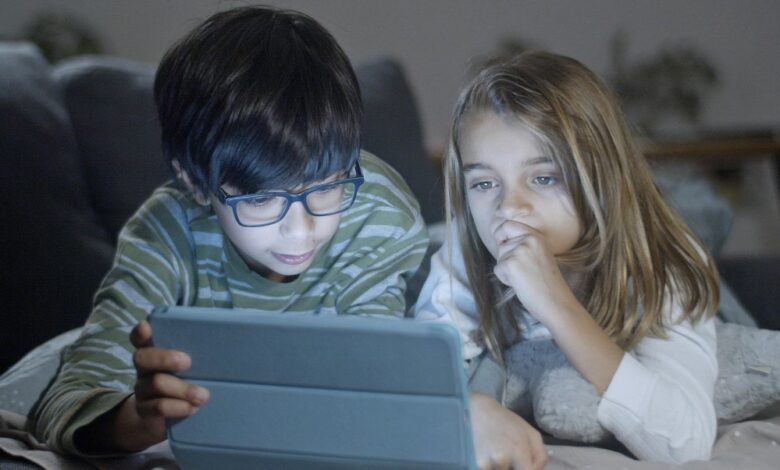Insta-Trapped: The Hidden Dangers of Social Media for Kids

By Hermoine Macura-Noble
Special to The Times Kuwait
In today’s digital age, social media has become integral to modern life, offering a platform for connection, entertainment, and information sharing. While it offers many benefits, the widespread use of social media among children and adolescents has raised serious concerns about its impact on their mental, emotional, and physical well-being.
“In my home country, I used to see my child playing outside, laughing with friends, and enjoying the simple things. Now, they’re glued to a screen, checking for likes and followers. They’re more anxious, comparing themselves to people they don’t even know, and it breaks my heart. It feels like social media is taking away their confidence and innocence,” Gulf-based parent, Amina Ahmed explains.
As children increasingly turn to platforms like Instagram, TikTok, and Snapchat, examining the potential harms that excessive social media use can inflict on their development is crucial. Most social media apps require users to be at least 13 years old. But according to the U.S. Surgeon General, nearly 40% of children aged between 8-12 years and 95% of children aged between 13-17 years old use social media apps.
One of the most significant negative effects of social media on children is its impact on mental health. The constant exposure to curated images of other people’s lives can lead to unhealthy comparisons, where children begin to measure their worth based on the number of likes, followers, or comments they receive. This can trigger feelings of inadequacy, anxiety, and low self-esteem. The U.S. Surgeon General released an advisory on how social media affects children and teenager’s mental health. One scary statistic? Teens who spend more than three hours a day on social media double the risk of depression and anxiety.
Studies have shown a correlation between high levels of social media usage and increased rates of depression and anxiety in children. The “fear of missing out” (FOMO) phenomenon is particularly pronounced, as children may feel left out or excluded when they see peers attending events or engaging in activities without them, leading to loneliness and emotional distress.

“Social media often creates a distorted reality, where kids constantly compare themselves to idealized images and lives. This endless comparison can lead to feelings of inadequacy, isolation, and low self-worth, which are all significant contributors to depression. We’re seeing more young patients struggle with these issues as social media becomes a bigger part of their lives,” shares Psychiatrist, Dr. William Jones.
The anonymity of the internet has also given rise to a troubling increase in cyberbullying, a form of harassment that can profoundly affect young people. Unlike traditional bullying, which typically occurs in a physical setting, cyberbullying follows children into their homes and invades their private spaces. According to one Clevland Clinic report, harmful language, images and videos are prevalent, with 64% of teens reporting they’re often or sometimes exposed to hate-based content online. Children targeted by online bullies may struggle with depression, anxiety, and sometimes much worse.
A Texas child died by suicide during an online game following cyberbullying in late 2023. According to local Houston authorities, a juvenile suspect in Michigan allegedly harassed the victim online until the child committed suicide. Amanda Todd, a 15-year-old Canadian student and victim of cyberbullying, hung herself at her home in British Columbia. A month before her death, Todd posted a video on YouTube sharing her experience of being blackmailed, bullied, and physically assaulted. There are thousands of cases worldwide in which parents disclose the dangers of social media, sometimes when it is too late.
Experts also say that social media use, especially before bed, can negatively impact children’s sleep patterns. The blue light emitted from screens interferes with melatonin production, the hormone responsible for regulating sleep. In addition, the addictive nature of social media can cause children to stay up late, endlessly scrolling through content, leading to sleep deprivation.
A lack of sleep can negatively affect a child’s cognitive functions, mood, and academic performance. Over time, chronic sleep deprivation can contribute to mental health issues like depression and anxiety, creating a vicious cycle that is difficult to break.
A growing number of children are also experiencing eating disorders, low self-esteem, and body dysmorphia as a result of trying to meet unattainable beauty standards they see on social media.

Additionally, prolonged exposure to fast-paced, bite-sized online content can reduce children’s attention spans. They may become accustomed to quick, easily digestible information and struggle to focus on more complex tasks, such as reading or problem-solving.
Excessive use can reduce children’s ability to form meaningful, face-to-face relationships. As they become more reliant on digital communication, children may struggle with developing critical social skills, such as reading body language, maintaining eye contact, and engaging in active listening.
This can lead to difficulties in forming deep, authentic relationships in the real world, as children may find it easier to communicate behind the safety of a screen than in person. Over time, this can result in social isolation and an inability to connect meaningfully.
“My husband and I used to always allow our kids to use social media and the internet to learn about the world and keep busy when we were out in public or had guests over. However, we noticed that after increasing social media usage and replacing real-life relationships with online ones, our 7-year-old son became slightly more aggressive. We decided to stop his iPad access after this,” shares Patricia Livingston.
While social media can provide opportunities for connection and creativity, its negative effects on children cannot be ignored. From mental health issues and cyberbullying to addiction and body image struggles, the potential harms of excessive social media use are far-reaching. Parents, educators, and policymakers must work together to ensure that children use social media healthily, promote digital literacy, and teach children the importance of maintaining boundaries online.
In an era of ever-present technology, it’s essential to prioritize the well-being of children and ensure that social media doesn’t hinder their growth and development.
 By Hermoine Macura-Noble
By Hermoine Macura-Noble
The first Australian English speaking News Anchor in the Middle East. She is also the Author of Faces of the Middle East and Founder of US-based 501c3 charity – The House of Rest which helps to ease the suffering of victims of war. For more from our Contributing Editor, you can follow her on Instagram, here.












